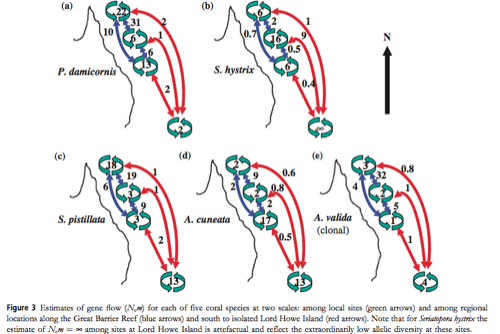The word "migration" is used in a more familiar sense of the word as meaning a periodical movement of individuals.
Migration, or gene flow, is defined in an evolutionary sense as "the transfer of alleles from the gene pool of one population to the gene pool of another population" (Freeman, Herron 225). Organisms tend to adapt to climate change by changing the geographic distribution of their environmental niche or by altering the specifics of their development and reproduction. This will lead to differences in the compositions of communities and in how they interact with one another (Hoffman). These diverging communities often have different allelic or genotypic frequencies. Gene flow or migration between two populations will help maintain similarities between the species, thus preventing (or slowing down) the process of speciation. In other words, gene flow/migration can help maintain genetic diversity in a population, but it will decrease variation between two populations.
Scientists Ayre and Hughes used these methods to study the genotypic diversity and gene flow in several species of coral in order to predict how these species might adapt (or fail to adapt) to climate change (Ecology Letters 2004). They concluded that genetic diversity varies greatly between coral species. The species S. hystrix was found to have low gene flow among local sites and regional sites. This species also had low genetic diversity, and thus the scientists inferred that this species was descended from a very small population initially. Surprisingly, S. hystrix has a very large geographic range. Another species that they studied, S. pistillata, had an equally large geographic range, but it had opposite Fst values (high genotypic diversity). Thus, Ayre and Hughes stated that Fst and Nm values could not accurately predict the geographic range of species. To read more about their research, you can access the paper here: 

Back to Introduction
Comments